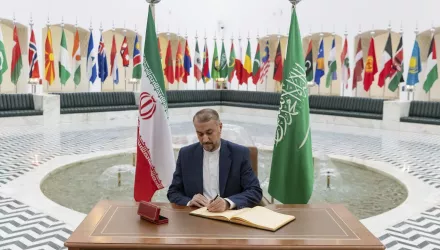Published originally in "Iran Daily" in Persian
The nuclear issue has dominated relations between the US and Iran over the past decade. Now that the two countries have shelved that issue by agreeing to the Joint Comprehensive Plan of Action, it is appropriate to ask where and how the national interests of both countries converge and conflict.
In my class at Harvard, to lift students’ sights above the instant images and chatter that consumes most of their attention, I sometimes ask them to step back -- way back -- and consider the perspective of a strategist from Mars.
Reviewing recent history, and setting the nuclear issue aside, what would this Martian observe about US-Iranian relations?
As a start, the Martian would note that since it took power in 1979, the Islamic Republic has faced three primary enemies: Soviet Union, Saddam’s Iraq, and the Taliban’s Afghanistan. The Martian would point out that, in 1991, the United States won the Cold War and the Soviet Union disappeared. In 2001, the United States invaded Afghanistan and overthrew the Taliban. And in 2003, the United States invaded Iraq and quickly overthrew Saddam’s government. He would, of course, add that the United States did not undertake these efforts for the sake of Iran. But it is indisputable that, in all three cases, Iran was a major beneficiary.
Looking to the future, are US and Iranian national interests more likely to be aligned or opposed? The vitriol of the current political season in both countries suggests the latter. But the Martian, and perhaps wise leadership on both sides, would recognize distinct areas of convergence. Two in particular stand out as opportunities for further (if unstated) collaboration: Iraq and Afghanistan.
In Iraq, Iranian and American interests align in the desire for a stable, majority-dominated and thus Shia government in Bagdad, and in the war against ISIL. First, consider how both countries’ military capabilities complement each other. While the US is unwilling to commit large numbers of troops in Iraq, Iran has aggressively deployed special forces advisers, weaponry and intelligence assets on the ground to combat ISIL. On the other hand, while the Iranian air force is essentially obsolete, the United States has sent some of its most sophisticated aircraft to prosecute the war from the skies. The uncomfortable but undeniable fact is that Iranians and Americans are working in concert to fight ISIL in Iraq. The mechanisms allow both a degree of deniability – such as using Iraqis as intermediaries – but the result is clear, and positive: ISIL’s rampage across Iraq has been halted and they have suffered significant defeats, such as in Tikrit. This cooperation will continue to be critical as Iraqi forces fight in Anbar Province and prepare to take back Mosul. Politically, in the short term, both Iran and the US seek to create a stable and unified Iraq (although these goals diverge in the long-term).
The interests of the two nations converge more than they conflict in Afghanistan as well. This convergence dates back to 2001 when Iran provided critical support to US forces in Afghanistan to fight the Taliban and played a decisive role in the formation of the new, US-backed Afghan government. According to Jim Dobbins, who lead the US diplomatic efforts in Kabul in 2001, it was the Iranians who suggested the inclusion of elections in Afghanistan’s new constitution. Last year, Iran helped facilitate the political compromise between Ashraf Ghani and Abdallah Abdallah that allowed for Afghanistan’s first democratic transfer of power. Today, both the United States and Iran are concerned with the revival of the Taliban, the remnants of Al-Qaeda and the newly formed Islamic State province in Afghanistan, and Iran is particularly concerned about the drug trafficking and lawlessness that prevails along its 900 km border with Afghanistan.
The list of issues on which American and Iranian interests diverge is a long one, including the security of Israel, the political future of Syria, and Iran's support for various groups across the region whom Americans see as terrorists. But the dispassionate Martian observer's main point would be to insist that the two states have much more in common than the political leadership of either acknowledge.
This commentary by Graham Allison was published originally in Persian by "Iran Daily" in a Special Issue for the Persian New Year. This is the English version sent to "Iran Daily."
Allison, Graham. “US and Iranian interests: Converging or Conflicting?.” Iran Daily, March 2016




